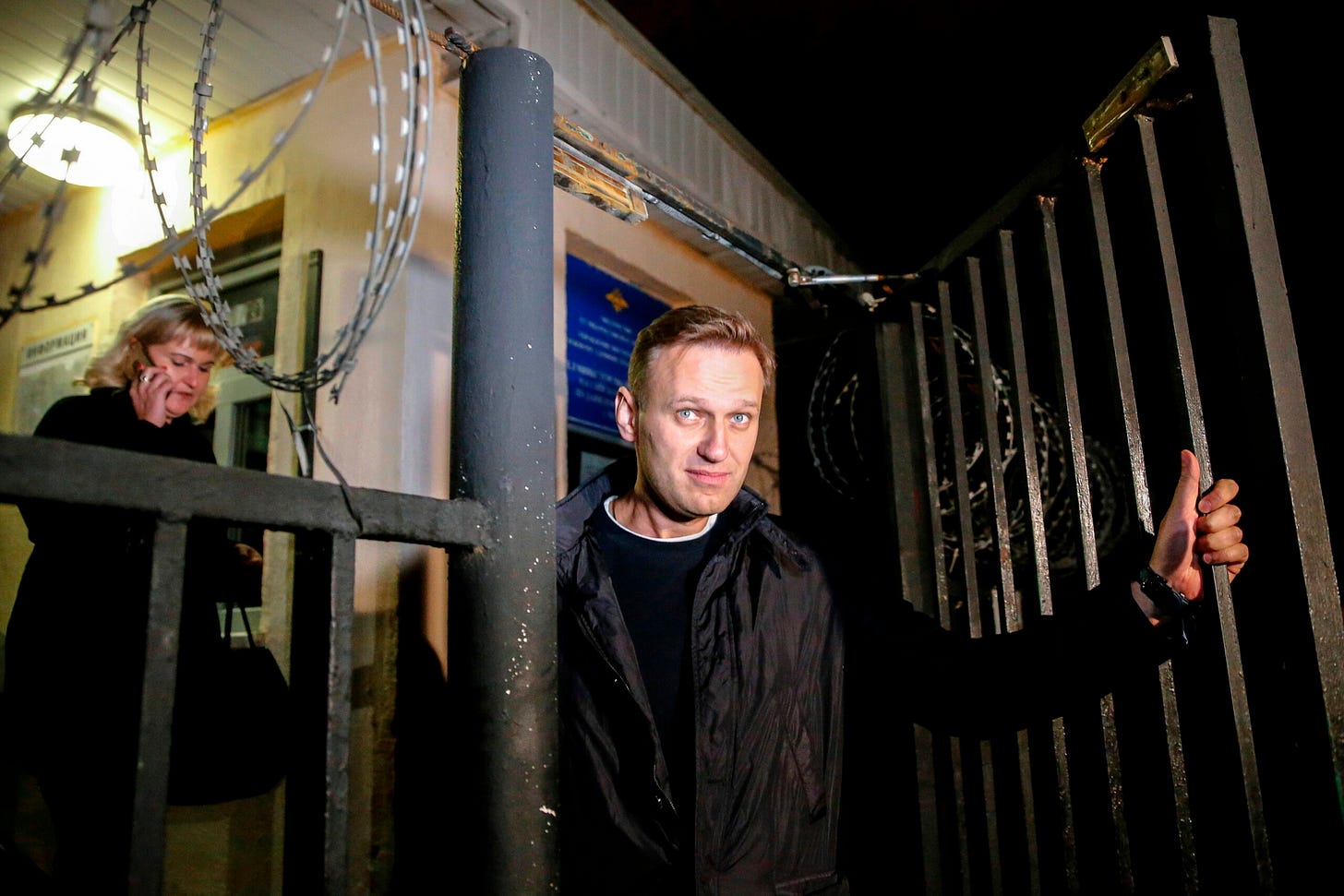‘Navalny’ Won an Oscar, But Navalny and Kara-Murza Are Still in Prison
The documentary is an excellent reminder of why Russian dissidents need international support.

When Navalny, the film about Russian democracy leader Aleksei Navalny, won an Academy Award on Sunday for the year’s best documentary, director Daniel Roher dedicated the award to Navalny and to all political prisoners around the world: “We cannot, we must not, be afraid to oppose dictators and authoritarianism wherever it rears its head,” he said.
Jailed on trumped-up embezzlement charges, Navalny is in solitary confinement in Russia’s Prison Colony No. 2 for his opposition to Vladimir Putin and for leading a campaign for freedom, rule of law, and an end to corruption in Russia.
On Monday, a Moscow court began the trial of another pro-democracy figure, Vladimir Kara-Murza, on treason charges—the first to be brought for opposition to Putin’s invasion of Ukraine, according to Human Rights Watch. Kara-Murza has been in pre-trial detention for 11 months after being sentenced to 15 days for “disobeying police.”
The persecution of Navalny and Kara-Murza should serve as a reminder of the link between Putin’s brutal war against a democratic, sovereign Ukraine and the spiraling domestic repression he has imposed on Russians who dare to oppose it. Putin’s dangerous, violent autocracy must be battled on both fronts: The West should provide Ukraine with everything it needs to defend itself militarily while also doing everything it can to protect the freedom and well-being of these brave and principled Kremlin critics, who are so necessary for ending the war and for any hope of one day bringing about a democratic, stable Russia.
Kara-Murza, a longtime Putin critic, is a journalist and filmmaker who has staunchly opposed Russia’s aggression in Ukraine since it began in 2014. He faces up to 25 years in prison for criticizing the war against Ukraine in remarks made abroad. Prosecutors say he depicted Russia as “an aggressor state in the eyes of the international community” and “damaged the international reputation of the Russian Federation.” Kara-Murza, wrote from jail that although he was “flattered by [the authorities’] assessment of my influence, I must admit that Putin has done a far better job of this than I ever could.”
Like all dictators, Putin seeks to present his country as monolithic, with its citizens unanimously accepting his rule (and abuses) and completely in step with his noxious nationalist distortions of history, claims to Ukrainian territory, perverse smearing of Ukrainians as “Nazis,” and lies about atrocities committed by Russian troops. To do this, he has forced all independent media and civil society organizations to close down or leave the country.
In fact, support among Russians for the war in Ukraine is significantly less than often reported, according to the Free Russia Foundation. After the full-scale invasion of Ukraine, thousands of Russians participated in protests across the country. Most were arrested and given short sentences or fines. Then, after Putin issued his mobilization order last September, hundreds of thousands of Russians—many of the country’s best and brightest—fled to avoid being drafted.
To short-circuit any sustained opposition, the authorities went after other prominent critics in addition to Kara-Murza and Navalny. The regime has sentenced Ilya Yashin, formerly the head of a Russian opposition party, to more than eight years for denouncing the atrocities in Bucha, the Kyiv suburb. Aleksey Gorinov, a Moscow municipal council member, got seven years for saying that the council’s priority should be opposing the war rather than organizing children’s’ activities. And Maria Ponomarkenko, a journalist, received six years for denouncing an aerial attack by Russian jets on a theater in Mariupol, Ukraine, that killed several hundred people. Scores of other journalists—or even casual users of social media—are on trial or facing fines or jail sentences in Russia for posts that the authorities decide “discredit” the Russian military. As Kara-Murza would be the first to point out, these are not the practices of a government that is confident in its popularity and legitimacy.
Both Kara Murza and Navalny share the distinction of having been poisoned by the Russian intelligence agencies. They both returned to Russia after their near-deadly poisonings, knowing that they faced almost certain imprisonment, out of a sense of patriotic duty to their country. The open-source investigative team Bellingcat has linked the same Russian Federal Security Service unit to poisoning Navalny once and Kara-Murza twice—as well as to three earlier poisonings of activists.
The outcome of Kara-Murza’s treason trial is bound to be a blow to his family and admirers. But Kara-Murza himself has always insisted that Russians will have a democratic future, and he continues to do so, even from his jail cell.
As dark as the coming days may be, there are things that Washington and its allies can do to help Russia’s democrats. The most urgent is helping Ukraine win to defend its own democracy and sovereignty. Putin’s defeat in Ukraine could even lead to the release of Navalny and Kara-Murza, who, with many other like-minded Russians, would have a chance to chart a democratic, peaceful future for Russia. Until that time, we must continuously press for their release and support their call for freedom.
There are many Russians who oppose Putin’s war and are paying a serious price for their opposition. Kara-Murza and Navalny represent the possibility of a future democratic Russia—one that would no longer threaten to invade its neighbors.

